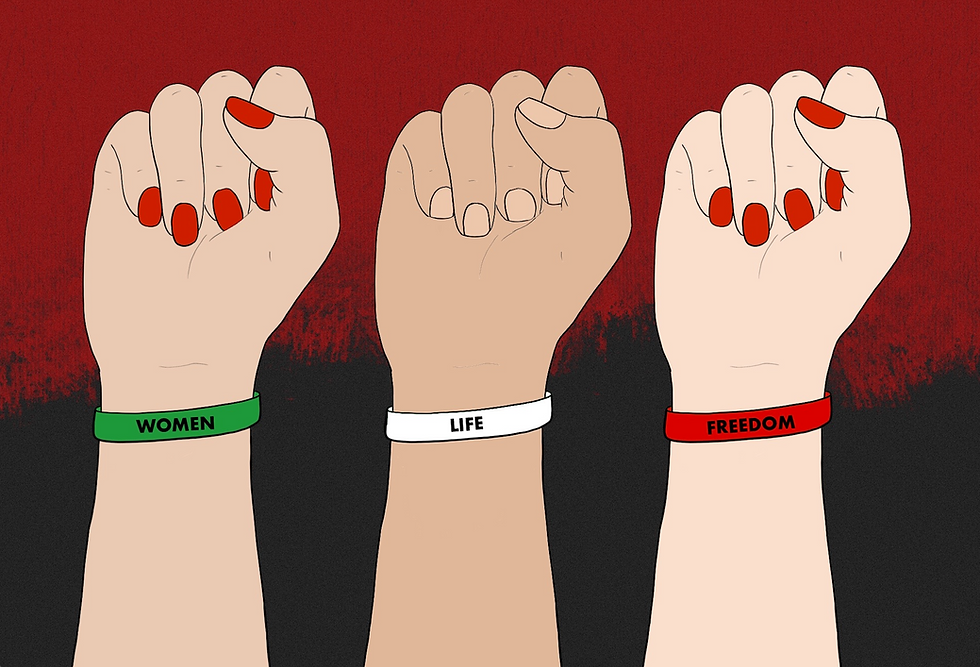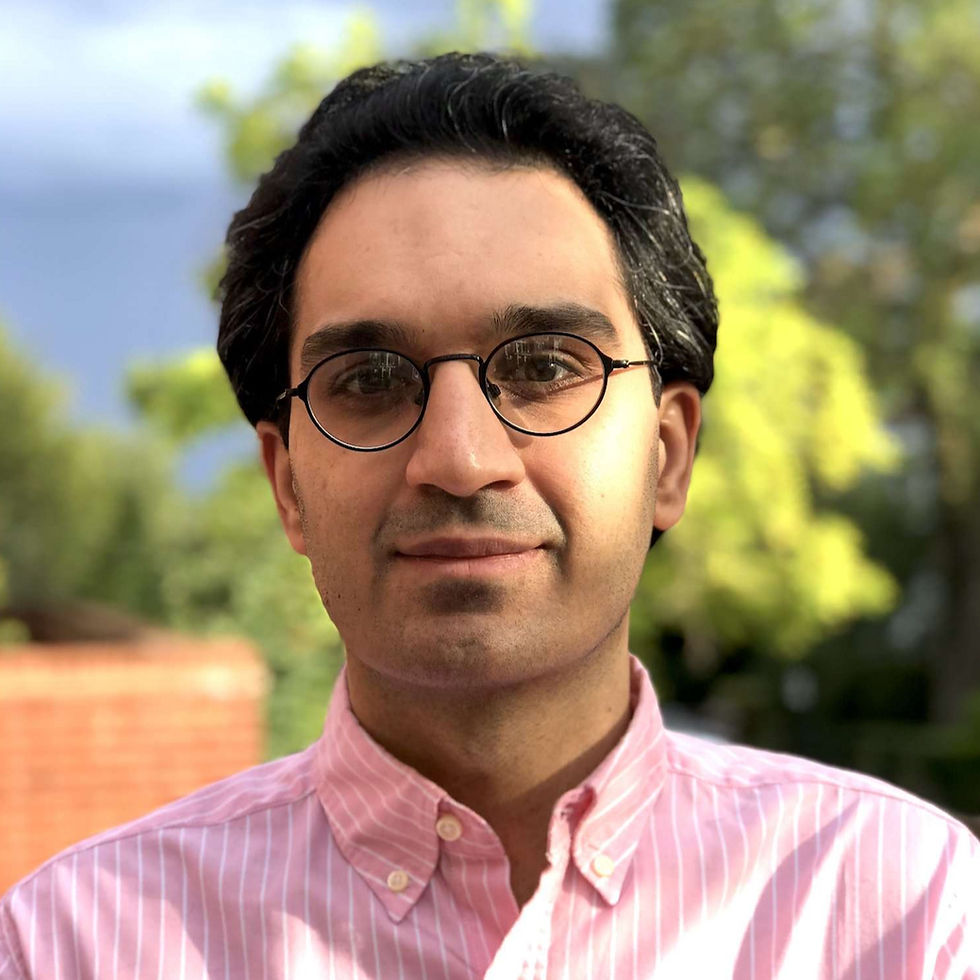Iran in transition – what is other nations’ “global” moral responsibility?
- Hossein Dabbagh
- Oct 23, 2022
- 7 min read
Updated: Mar 13

Illustration by Roshi Rouzbehani.
The recent tragic killing of Mahsa Amini for “bad hijab” by the so-called morality police (Gasht-e-Ershad) in Tehran has triggered anger and rage among the people living in Iran and Iranians worldwide. Iranians rightly march, campaign, and protest against the regime to condemn the injustice. Non-Iranians, from politicians to celebrities such as Justin Bieber and Kim Kardashian, have joined this campaign to show their solidarity. The current protests have already changed the landscape of Iran’s political legitimacy. It is politically interesting to ask what protesters want out of these protests: That the morality police should be banned? That what is considered “hijab law” in Iran should be changed? Or that the regime should be changed? What implicit or explicit message do these protests try to convey?
In this piece, I argue that the main message we should learn from these protests is that the existing socio-political structure in Iran is no longer viable because it suffers from structural injustices, and the search for structural change is already in place. If I’m right about the main message, an immediate question concerning other nations’ responsibility in rectifying injustices would arise. Are non-Iranians morally responsible for fighting against injustices in another nation-state? In the second part of this piece, I argue that every global citizen, beyond their nation-states, is morally responsible if, all things being equal, they have the power to end or mitigate the injustices faced by Iranians.
The demand to put a blanket ban on the morality police was perhaps significant when the protests started almost 20 days ago in different cities in Iran. However, this is not the case anymore. It seems that protesters are chasing to change something more serious – people are “sick of the Islamic Republic”. Although a blanket ban against the morality police is desirable, deep-rooted systematic injustices will occur as long as the system is structurally and inherently unjust.
What about changing the hijab law? It might structurally change the Islamic legal system in Iran. But the implication of changing the hijab law is detrimental to the regime of Iran because the entire socio-political structure of the Islamic regime absurdly depends on the hijab law. Even a minor reform to the law might lead to system breakdown, let alone changing the law entirely. The Islamic regime of Iran knows this very well. That’s why they appeal to brutal oppression – the only way to survive, if possible!
What is the alternative if changing the hijab law is not the main message? Well, it seems that an implicit message one should receive from these protests is that the current socio-political structure of the Islamic regime of Iran is not viable – they cannot and ought not to continue with the existing structure. Iran’s socio-political system is in dire need of structural change. To put a blanket ban on the morality police would not be major surgery; it would be a band-aid! But should Iranians call for major surgery? It seems so because the injustices they experience are structural; hence they must consider the harms incurred by injustices beyond the circumstances of individual arrangements and look at the impact on the wider socio-political structure. Structural injustices exist when people live under institutional oppression and are deprived of exercising their basic rights to live decent lives. The law to force women to wear hijab is a case in point. It structurally deprives citizens of their basic right to freedom of expression unjustly. That’s why the Iranian resistance chant has become: Zan, Zendegi, Azadi (#WomenLifeFreedom).
But who is morally responsible for ending or mitigating structural injustices? I argue, it is anyone who has the power to end structural injustices or make structural injustice less unjust. They are morally responsible, at least in cases where sacrificing anything morally significant is not required. However, not everyone bears the same amount of responsibility in the same way and to the same degree. With great power comes great responsibility. The responsibility of international organisations and multi-national companies, given their greater power to effect change, is much greater than individuals. However, this does not entail that individuals are not morally responsible at all. They are responsible in the sense that they have a moral obligation to rectify injustices or end them if they have the power to do that. The notion of responsibility that I am defending here is a forward-looking account, different from the liability notion of responsibility. Following my account of responsibility, even if we are not to blame in a strict sense, we are responsible in terms of doing something to end or mitigate injustices.
Let me explain my argument with reference to Iris M. Young’s “Social Connection Model”. Following Young’s model, we should consider ourselves responsible globally, at least when a structural change is necessary to end structural injustices. In her view, we are responsible with respect to structural injustices in the sense that we have an obligation to cooperate with those who share that responsibility to make the structural injustices less unjust. We have obligations globally because people across the world are all connected socially and politically, regardless of their nation-states. We are all socially connected and belong together interdependently so the benefits and harms of a socio-political system will affect other socio-political structures. Consequently, we are responsible for preventing harm to others when the course of actions in the rest of the world will inevitably affect us.
What if injustice in other countries won’t affect us? Do we have reason to take them seriously? Yes, if we adopt a non-consequentialist approach. One might argue that since injustice is intrinsically bad, everyone has a deontological obligation to fight against it, regardless of the consequences. We are responsible altruistically for helping those faced with injustice, even if the elimination of injustice is not beneficial to us, providing that our sacrifice is reasonable.
Either way, be it a deontological or a consequentialist justification, the first step to redressing these structural injustices is to endorse that our moral responsibility for structural change extends beyond our nation-states, and we should take our global moral responsibility seriously.
Let’s discuss other nations’ global moral responsibility in Iran’s case. Below, I propose five ways that I believe global citizens should adopt as their moral responsibilities in the hope of transforming structural injustice.
First and foremost, we should respect the protesters’ right to structural change in Iran. If they are justified to exercise their rights to take up structural change, correlatively, it is our responsibility to support them, in any way we can, in fighting against structural injustice. We are responsible because “injustice anywhere is a threat to justice everywhere”.
Second, at least a considerable number of Iranians do not agree with the current socio-political structure. They are losing their lives to exercise their political and civil right to raise their oppressed voice. We should shed light on the brutal oppression of the Iranian regime through good journalism -- justice dies in darkness! It is our responsibility to echo their voice while they experience oppression. Let’s become their voices and share their news on social media platforms, specifically when the internet is shut down by the Iranian regime.
Third, we have an obligation to respect, protect and fulfil the protesters’ human rights. It is not enough to only respect or protect their rights. International organisations and large multi-national companies have the power to fulfil their welfare rights, e.g., access to the internet. They can use their power or influence to provide alternative communicative ways. For example, the activation of Elon Musk’s Starlink satellite to provide uncensored internet access to Iranians was a good recent attempt though it was not effective. Instead of imposing morally problematic indiscriminate sanctions, I believe it makes more sense if high-income economies use their power to provide more opportunities for the protesters to raise their voices. However, this does not entail that imposing any sanctions is morally problematic. Targeted sanctions (e.g., Magnitsky Act) might be a defendable alternative solution to sanction human rights offenders.
Fourth, let’s update our views on Iran – the new generation (Gen Z) has a new interpretation of politics, religion, sexuality, etc. They need to be heard and seen. The least we can do is to recognise their voice by bringing their oppressed views to the surface and debating their values on academic platforms. I believe universities have a key role to play here. They have the power to give a platform to these unheard, oppressed voices to be discussed, analysed and critically reviewed impartially. We should not forget the power of collective action.
Last but not least, policymakers should push for an open borders policy. The existing oppression in Iran works as a cancel culture against those with unorthodox views. Oppression deprives people of an opportunity to develop themselves appropriately. Providing an equal opportunity for the oppressed to pursue their self-development is beneficial, assuming we have the resources to do that.
Let me conclude by responding to a potential objection. An objector might argue that we might not have a moral duty to end structural injustices elsewhere because we have a weightier duty to respect a nation’s political self-determination (e.g., Iranians’ political self-determination). This, however, undermines third-party intervention to fight against injustice, specifically in cases of “ordinary oppression”, i.e., cases other than “supreme emergency” situations like genocide. The reason is that interference in other countries’ internal affairs often carries a significant risk of worsening matters. Thus, a nation should determine its future without other nations’ intervention.
In response, I concede and concur that we have good reason to believe that military humanitarian intervention is not morally justified in cases of “ordinary oppression” (e.g., Iran’s current situation). Military intervention in ordinary oppression is likely to bring about enormous unnecessary harm (physical and psychological) for the oppressed innocent people, which renders it unjustified. However, this does not entail that we shouldn’t support an oppressed nation to fight against injustice non-militarily. Yes, we should respect a nation’s political self-determination because, without self-determination, people lose their sense of belonging to a nation, and they become alienated over time. However, what about cases where a nation’s sense of “self” is already damaged because of oppression and domination? What if structural injustices deform a nation’s “self”? What if at least parts of a nation ask for help? It seems that in these situations where structural injustice significantly impacts a sizable portion of a nation’s population’s right to self-determination, we are responsible to take mitigating steps or to contribute to ending oppression in order to provide an opportunity for the nation to obtain and exercise its right to self-determination. This is, as I have argued, on the condition that we are not sacrificing anything morally significant. We are responsible because of our role in structural injustice in Iran, and our responsibility is to help the nation genuinely determine its preferences rather than adapting its deformed “self” to oppressive situations.
About the Author

Hossein Dabbagh is an assistant professor of philosophy at Northeastern University London. His published research stretches across three broad fields: moral philosophy, political theology, and practical ethics.

Comments